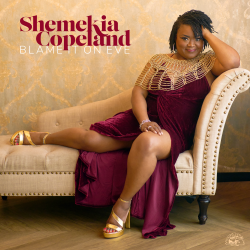
Why the blues is at the heart of all American roots music.
Texas bluesman Johnny Copeland was at the forefront of keeping the blues alive and fresh in the ‘80s and ‘90s, and now his daughter is doing the same in the 21st Century. She is viewed as one of the leading blues vocalists and has recorded with various American roots musicians over the years including Steve Cropper, Dr. John, Jason Isbell, Emmylou Harris, Jerry Douglas and Sam Bush to name only a few. Americana UK’s Martin Johnson caught up with Shemekia Copeland over Zoom to discuss her new album, “Blame It On Eve”, which is her fourth with Nashville-based songwriter, producer and musician Will Kimbrough. She shares the fact that her dad was a fan of country music, and how she heard it a lot growing up. She discusses her educational activities and her aim to leave a better world, particularly for her seven-year-old son. She also talks about Tee Tot Payne, a black guitarist who had a major, but unheralded, influence on country music.
How are you?
I’m fine. I’m at home, and I’ve just got back from Europe. It’s been a busy summer, it’s been great.
How much of an influence was your dad Johnny Copeland on your own music?
My parents were amazing, and I’ve always said you can’t be in this business unless you have a strong foundation, and fortunately for me, I had a strong foundation thanks to both my parents. They were really amazing. As an artist, my father was extremely talented, he was anointed, he could sing, he could play, he could write, he could just do everything.
Over the last few years you’ve brought other roots influences to your own music, recording with Emmylou Harris, John Prine, Rhiannon Giddens, Jason Isbell, and Jerry Douglas among others.
I just love American roots music, and to me, blues is the root of everything. I really enjoy all the elements of American roots music, so we’ve had African banjo, banjo, fiddles, we’ve just had so much fun with this music, tubas and everything. We have cellos on this new record, it’s amazing.
You have sacred steel player Dashawn Hickman on the record as well as Jerry Douglas. How close do you think the country and sacred steel traditions are?
There’s a little bit of difference, but both are very beautiful. I love them both, but to me, they definitely have a different sound.
“Blame It On Eve” is the title of your new record.
 In our country, women’s rights are being taken away and dissected. So, the song ‘Blame It On Eve’ is basically about that, and how it’s a horrible thing to do. That’s what it’s about, and it is kind of the opposite really because we are not blaming Eve, that’s what we’re saying they’re doing.
In our country, women’s rights are being taken away and dissected. So, the song ‘Blame It On Eve’ is basically about that, and how it’s a horrible thing to do. That’s what it’s about, and it is kind of the opposite really because we are not blaming Eve, that’s what we’re saying they’re doing.
You worked a lot with Will Kimbrough on the album, he co-wrote a lot of the songs, he produced it. How does that relationship work?
This is our fourth record together, and it happens so organically and we work so well together, me, John Hahn, Will Kimbrough. It really is a dream team, because we are so like-minded and we all know what we want, and Will Kimbrough is just so extremely talented that there’s nothing I can say that I want to do that he’s not capable of.
How would you describe your sound?
I would say it’s definitely American roots music, and mostly blues.
You have some personal history on the record.
Absolutely, ‘Tough Mother’ is definitely autobiographical because there have certainly been a lot of things going on in my life over the past few years, and we put it all into song. So, that was very cool. Then, of course, we have educational things on it, and I love to do that. On every record, I like to put a little piece of education in there. On one record I talked about The Clotilda, on the last record I talked about the Gullah people in South Carolina, and on this record, we’re talking about Tee Tot Payne. Nobody knew about him, but he heavily influenced country music, because he was a heavy influence on Hank Williams. There’s such a lot of cool stuff going on on this record, it is a much lighter record than my previous records, so I think it is a lot more fun and that is the place where I’m at right now in my life, and that’s what I wanted to put out there.
What did you think of country music when you were growing up with your dad?
Me and my dad would sit around the house and sing country music songs together, like ‘I’m So Lonesome I Could Cry’, because my dad was born and raised in Texas, and there were only two types of music there at that time, country and western. So, my dad was raised on country music, and he was always a fan.
What are your views on The Black Opry?
My views on that are that there shouldn’t have to be a Black Opry, everybody should be welcomed at the Opry. Unfortunately, you’ve got to have either one or the other, when there should just be one.
Do you think they do a worthwhile job?
Inclusivity is so important to me, and that’s what we should be working towards right now, just being inclusive.
How important are your educational activities to you personally?
It’s definitely important, you want to leave the world a better place. I have a son who is seven, and I want to make sure of leaving him in a good place, so the behind-the-scenes work is the most important work.
How did you select the songs for the record?
Everything for us has to be very calculated because when you’re making blues records there isn’t a lot of money involved, it’s not like we get to sit in the studio for months at a time and figure it out. There’s not enough money to do that, so we have to be very much in tune with one another and be very prepared. So, there’s lots of conversations and lots of talk, and it really happens organically for us now because we’ve been doing it for four records. We just work well together, we really do.
You recorded your dad’s ‘Down On Bended Knee’.
I’ve recorded one of my dad’s songs on every record so far, and I wanted to do that one for this particular record. It just seemed to fit, it’s your basic blues love song.
Apart from your dad, who else has really influenced your style?
Definitely him the most. I love strong women singers, so Koko Taylor was a big influence on me, and then in my career, I’ve gone on the road with all the giants in the business. I’ve spent months on tour with B.B. King, Buddy Guy, and Dr John, Robert Cray, Taj Mahal, and all these amazing artists, and so you just watch them and see how they move, and they are all so amazing.
Do you feel that there is a generational change occurring in the blues?
We’ve just lost John Mayall, who I toured with quite a bit. I try not to think about it, I don’t like putting any sort of pressure on myself. I just do the work, and I continue to make albums and tour and I will keep doing that until I can’t anymore. Hopefully, some young girl will be able to say I was her influence. Also, we don’t know what my son is going to choose to do, he is very smart and he’s very bright, he’s very outgoing, he can do just about anything.
Any plans to play in the UK in 2025?
I would love to tour the UK, and I’m really hoping to get there in 2025, that would be amazing because it’s always been one of my favourite places. Please watch the listings, and let folks know you want to see me over there. Tell them, bring Shemekia Copeland because she’s ready to come.
At AUK, we like to share music with our readers. What are three of your favourite tracks, albums or artists on your playlists?
On my new album, I did a song with Pascal Danae of Delgrès, so I’ve been listening to a lot of Delgrès. I’m always listening to Ali Farka Touré, Ry Cooder, music like that. I love listening to the old-school stuff like Sam Cooke, you will hear me listening to that all the time. Music like that, that’s what I’m listening to, that’s what keeps me going. However, I do really enjoy sitting in the quiet too.
Finally, do you want to say anything to our UK readers?
I can’t wait to get there, thank you for the support, because I get so much love and support from the UK fans, and as soon as I can, I’m going to get there, I promise.
Shemekia Copeland’s “Blame It On Eve” is out now on Alligator Records.



